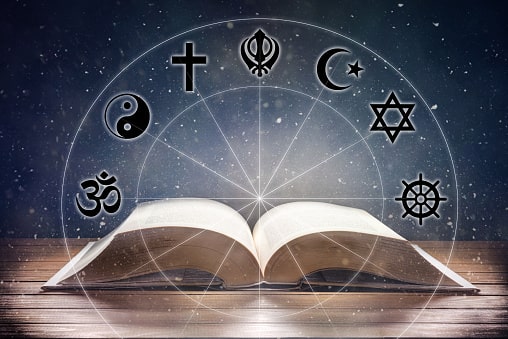Being religious means adhering to a structured belief system, acknowledging a divine power, and participating in rituals prescribed by a specific institution. Over 84% of the global population identifies with a religion, such as Christianity, Islam, or Hinduism, each with holy texts, prayer practices, and doctrines.
In contrast, spirituality is a personal, evolving journey focused on self-discovery, inner peace, and a connection to a higher power beyond religious norms. Spiritual individuals seek truth, love, and purpose without relying on fixed rituals or fearing divine punishment.
However, Religion offers community and tradition, whereas spirituality offers freedom and introspection.
Understanding these differences between religion vs spirituality helps clarify your belief system. Let’s take a closer look below.
What Is Being Religious?
As stated earlier, being religious means being completely devoted to a religious institution and accepting its norms.
When you claim to be religious, you acknowledge the presence of an ultimate universal power. People regard religion as holy, divine, sacred, and absolute, requiring special reverence from us.

As the institution says, being present in religion means praying to your believed deity. For example, Christians believe in God, Muslims believe in Allah, and Hindus have their deities.
Similarly, there is a sacred Holy book for each religion. The Bible is the scripture for Christians; Muslims read the Quran, and Hindus read the Bhagavad Gita.
Religious participation means attending church, mandir, or mosque and offering prayers regularly. Again, if you’re genuinely devoted to spiritual practices, you must follow the institution’s rules.
What Is Being Spiritual?
Spirituality is a broader concept than religion. It’s the acceptance that there is something greater than yourself but not limited to an institute.
Spirituality is the belief that there is a greater power beyond our sensory experience, but we’re a part of it. That unseen power is greater than yourself and divine in nature.

Spirituality makes you realize that there is something greater than our everyday lives. We have a bigger purpose in life; it is the journey to delve into that more significant purpose.
Being spiritual means exploring universal aspects such as peace, love, truth, wisdom, the desire to understand the afterlife, and altruism. Spiritual people understand, and some may even thrive, in achieving the higher self, which saints or Yogis have attained through years of meditation and various devoted practices.
Spirituality is about developing self-esteem, self-worth, self-confidence, and believing in yourself. When a person becomes entirely spiritual, they no longer feel bothered by mundane things like ego, selfishness, jealousy, etc.
Spirituality is much above such petty things. But achieving such a higher state isn’t easy. It requires complete devotion and a lot of work. This is the reason spirituality is considered to be much more than religion.
A religious person has a somewhat narrow perspective about the higher self. It’s mainly limited to following the customs of a single deity or the norms of a particular religion. But spirituality, as I said, believes in the broader universe.
The Primary Difference Between Religion And Spirituality
Now that you’re clear about the difference between Spirituality and Religion, let me take you through the primary differences between the two-

1. Spirituality Has No Rules, But Religion Has
Spirituality is the belief in intuition and forming a deeper connection with yourself. In contrast, religion follows a dedicated set of rules or ideologies.
When you’re spiritual, you don’t have the pressure to be good or devoted to your God. Spirituality sets you free from the fear of punishment or repercussions if you break any rule.
Whereas a religious person always fears the angst of God and of higher authorities. Religion asks you to visit the church, offer prayers in the temple, or read the Bible or Namaz five times daily. Spirituality has no such pressure; in another sense, it ultimately sets you free.
In simple words, spirituality is formless, whereas religion is organized. Religion has a proper structure of morality, doctrines, rules, and even specific dress codes.
There is no such thing as spirituality. Spirituality has no rigid structure, and one goes on a structureless path of self-discovery.
2. Religion Is Objective While Spirituality Is Not
If you’ve noticed, religion is often perceived as objective. Any formal religion places greater importance on external things, such as holy scriptures, religious institutions, and various rituals associated with different festivals.
But there is no such thing as spirituality. As I mentioned above, spirituality is more about being aware of yourself. It focuses more on the internal truth and forming a deeper relationship with your inner self.
Therefore, spirituality is always subjective. It may vary from person to person. Your belief system may not match another spiritual person’s, and that’s perfectly fine.
3. The Core of Spirituality Is Love, While The Core Of Religion Is Usually Fear
All these differences are pretty interconnected. Again, I have mentioned already that your connection with a specific religion is always based on fear.
You’re always scared about what if you don’t follow the customs of your religion. Or what if you haven’t lived your life as per your Holy scripture? Christians fear the eternal torments they might face in their afterlife, etc.
Spirituality takes this fear off your shoulders. Spirituality always begins with love. It focuses on the positive energies around you. It teaches you to be positive and courageous even in the darkest times of your life.
4. Religion Divides You While Spirituality Does Not
Have you ever seen anyone following two or more religions simultaneously? No right. Different religions have distinct beliefs, and they interpret them in their own unique ways.
Likewise, all religions have customs, rules, and different ways of offering prayers to their God, which creates differences among people.
But spirituality is beyond that. Spirituality sees the ultimate truth and the divine message. It does not care about how the message is delivered or in what form that ultimate truth is shared.
Hence, spirituality does not create any institutional disparity among people.
5. Spirituality Believes In Karma, Not Punishment
All religions, Hinduism, Christianity, or Islam, believe in punishment in the afterlife. But spirituality does not. It instead believes in the Karma or law of attraction.
Spirituality says you get what you give. You’re liable for your actions and believe in the universe’s reaction mechanism. You’ll get the results of your actions in this life; as the saying goes, “You reap what you sow.”
6. Religion Is Traditional, While Spirituality Is Evolutionary
Religious practices, customs, rituals, norms, etc., have been practiced for years. These are deeply rooted in our culture, and religious institutes protect them. They have been preserving the commands of their religious authorities.
Spirituality isn’t that rigid when it comes to religious practices. It keeps a flexible approach and believes spiritual growth is an evolutionary process. Hence, the rituals and customs may change or evolve as time passes.
Spirituality is not so much about following the ancient stories of saints and angels as it is about creating your own path in the journey of self-discovery. Since spirituality is about discovering one’s truth, people develop their beliefs on the journey.
7. Inclusivity And Exclusivity
Religion is, at times, exclusive. Different religions create their exclusive belief system per their holy scriptures and the saying of their religious deities or saints.
Spirituality is inclusive, considering it does not believe in any specific religion. The core belief of spirituality is that you’re a part of the bigger whole, just like everybody else.
The above-mentioned are core differences between religion and spirituality. If I have to conclude the difference between them in one word, I would say religion is orthodox, while spirituality is flexible and evolving.
How to Know If You Are Religious or Spiritual?
Understanding whether you’re religious, spiritual, both, or neither can be a journey of self-discovery. Here are some key points to consider:
a) Beliefs and practices: Religious people often follow established doctrines and participate in organized rituals. For example, attending church regularly or following specific dietary laws. Spiritual individuals, on the other hand, might create their own practices, like personal meditation or nature walks.
b) Source of guidance: Religious individuals typically look to sacred texts, religious leaders, or established traditions for guidance. Spiritual people might seek wisdom from various sources, including personal experiences, nature, or various philosophies.
c) Community involvement: Being religious often involves being part of a specific faith community. Spiritual individuals might prefer individual practices or looser, more diverse spiritual groups.
d) View of the divine: Religious people usually have a defined concept of God or gods based on their faith’s teachings. Spiritual individuals might have a more abstract or personal understanding of a higher power or universal energy.
e) Approach to life’s big questions: Religious individuals often find answers to life’s mysteries within their faith’s framework. Spiritual people might be more comfortable with uncertainty and ongoing exploration.
f) Rituals and traditions: Religious people typically engage in specific rituals and observe holidays associated with their faith. Spiritual individuals might create their own meaningful rituals or borrow from various traditions.
g) Moral compass: While both religious and spiritual people can have strong moral values, religious individuals often derive their morality from their faith’s teachings. Spiritual people might develop their moral code from various sources and personal reflection.
Remember, these categories aren’t mutually exclusive. Many people find themselves somewhere on a spectrum, combining elements of both religiosity and spirituality. The key is to reflect on your beliefs, practices, and what brings meaning to your life. This self-awareness can help you better understand your spiritual or religious identity.
So Are You Religious Or Spiritual?
After seeing the above distinctions, I’m sure it’s pretty easy for you to decide whether you’re religious or spiritual. Suppose you’re a true follower of any religious beliefs. In that case, you’re religious, and if you want to form a deeper belief system and want to develop a strong connection with your inner self, you’re spiritual.
However, religiosity and spirituality are not always stagnant. People may transform. People may no longer want to continue their religious practices, such as following a predetermined concept of God and religious customs.
The more you gain a deeper insight into understanding who you are or your truest self, the more you become a spiritual person. The orthodox approach will no longer affect you, and you will set yourself free from everything.
Related Read:
Final Thoughts! Difference Between Religion And Spirituality
If you follow fixed rituals, sacred texts, and organized worship within a religious institution, you are likely religious. If your beliefs stem from inner awareness, a quest for meaning, and a connection to something greater beyond organized religion, you’re spiritual.
Religion emphasizes structure, fear of divine judgment, and exclusive belief systems. Spirituality emphasizes love, karma, and universal inclusivity. Both paths offer value, but while religion provides order and community, spirituality offers flexibility and personal growth.
Knowing which aligns with you depends on whether you seek divine connection through tradition or through introspective freedom. Many today identify with elements of both paths. What about you?